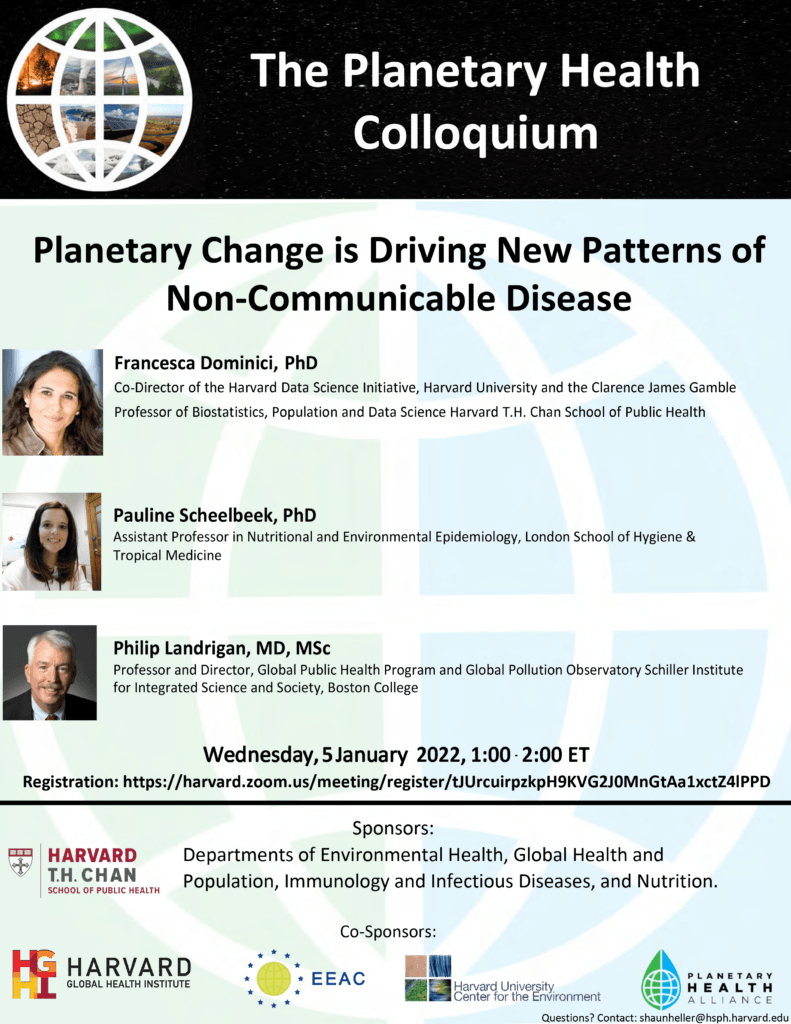
The Departments of Environmental Health, Global Health and Population, Immunology and Infectious Diseases, and Nutrition, along with the Harvard University Center for the Environment, the Harvard Global Health Institute, and the Planetary Health Alliance warmly welcome Francesca Dominici, Pauline Scheelbeek and Philip Landrigan as the fourth speakers of the Planetary Health Colloquium Series. The event will be streamed live from Zoom, please register at: https://harvard.zoom.us/meeting/register/tJUrcuirpzkpH9KVG2J0MnGtAa1xctZ4lPPD
Francesca Dominici, PhD
Dr. Francesca Dominici, PhD is the co-Director of the Harvard Data Science Initiative, at the Harvard University and the Clarence James Gamble Professor of Biostatistics, Population and Data Science at the Harvard T.H. Chan School of Public Health. She is an elected member of the National Academy of Medicine and of the International Society of Mathematical Statistics. She is an expert in causal inference, machine learning, Bayesian statistics. She leads an interdisciplinary group of scientists with the ultimate goal of addressing important questions in environmental health science, climate change, and biomedical science. Her productivity and contributions to the field have been remarkable. Dominici has provided the scientific community and policy makers with robust evidence on the adverse health effects of air pollution, noise pollution, and climate change. Her studies have directly and routinely impacted air quality policy. Dominici has published more than 220 peer-reviewed publications and was recognized in Thomson Reuter’s 2019 list of the most highly cited researchers–ranking in the top 1% of cited scientists in her field. Her work has been covered by the New York Times, Los Angeles Times, BBC, the Guardian, CNN, and NPR. In April 2020 she has been awarded the Karl E. Peace Award for Outstanding Statistical Contributions for the Betterment of Society by the American Statistical Association. Dominici is an advocate for the career advancement of women faculty. Her work on the Johns Hopkins University Committee on the Status of Women earned her the campus Diversity Recognition Award in 2009. At the T.H. Chan School of Public Health, she has led the Committee for the Advancement of Women Faculty.
Pauline Scheelbeek, PhD
Dr. Pauline Scheelbeek is an Assistant Professor in nutritional and environmental epidemiology at the London School of Hygiene & Tropical Medicine. She is also the Director of the WHO Collaborating Centre on Climate Change, Health and Sustainable Development. Pauline’s research focuses on finding healthy, sustainable, resilient and realistic solutions that will accelerate transformational food system change, especially in the Global North. Currently she co-leads the multi-country Sustainable and Health Food Systems (SHEFS) project as well as the Food system Adaptations in Changing Environments in Africa (FACE-Africa) project in the Gambia. In this context she models future food systems for the UK, South Africa, India and The Gambia under several climate change, environmental, health and behavior change scenarios. Pauline is an active STEM ambassador and frequently organizes public engagement activities for school aged children in the UK and sub-Saharan Africa around environment, nutrition and health issues.
Philip Landrigan, MD, MSc
Dr. Philip Landrigan is a pediatrician, public health physician and epidemiologist. His research uses the tools of epidemiology to elucidate connections between toxic chemicals and human health, especially the health of infants and children. I am particularly interested in understanding how toxic chemicals injure the developing brains and nervous systems of children and in translating this knowledge into public policy to protect health His early studies of lead poisoning demonstrated that lead is toxic to children even at very low levels and contributed to the US government’s decision to remove lead from paint and gasoline, actions that reduced population mean blood lead levels in the USA by more than 90%. A study Landrigan led in the 1990’s at the National Academy of Sciences defined children’s unique susceptibilities to pesticides and other toxic chemicals and catalyzed fundamental revamping of US pesticide policy. He was also involved in the medical and epidemiologic follow-up of 20,000 9/11 rescue workers. The studies of these men and women documented that more than 40% have persistent abnormalities of pulmonary function and that approximately 15% have mental health problems related to their service. From 2015 to 2017, Landrigan co-chaired the Lancet Commission on Pollution & Health, which reported that pollution causes 9 million deaths annually and is an existential threat to planetary health. He now directs the Global Observatory on Pollution and Health at Boston College.



